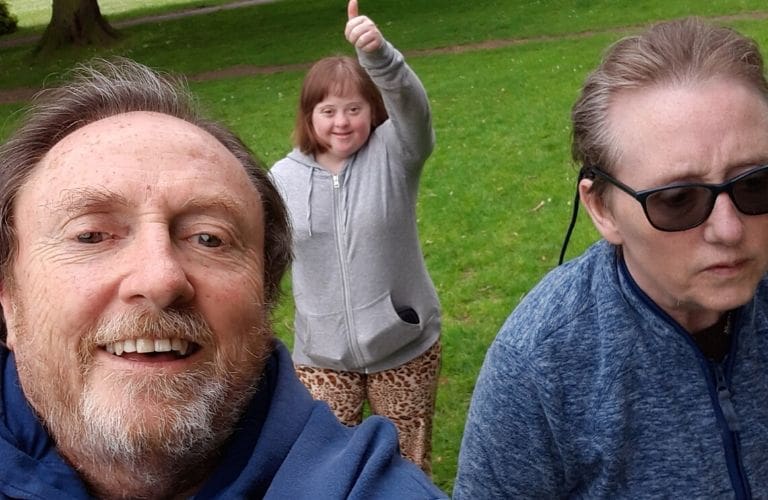John's story: "To our daughter, I am now mum and dad”
John’s wife Linda was diagnosed with young onset Alzheimer’s disease at the age of 53. They have been supported by Admiral Nurse Lesley.

John and Linda with their daughter Katie
Many people assume that Alzheimer’s disease is something that happens later in life. For us, it arrived unexpectedly and far, far too early.
I met my wife, Linda, in 1985, we were married in 1989 and had our first child, Tom, in 1991. My daughter, Katie, followed in 1993.
Soon after Linda turned 50, I began to notice changes in her personality. She wasn’t quite as responsive as before.
Over the next couple of years, she started forgetting appointments and burning food. One time, she needed to pick up Katie from a dance session but got completely lost and distressed, despite previously knowing the route.
“The route to diagnosis was tortuous”
Linda was finally diagnosed with Alzheimer’s disease in 2015, at the age of 53, after a long, tortuous process. One neurologist dismissed my concerns that Linda had dementia, saying it must be stress, and only agreed to send us to a specialist in London after much persuasion. Another said she had frontotemporal dementia – a particularly aggressive form of dementia. Wrong again.
Finally, after an MRI scan and lumbar puncture (where fluid is taken from the spinal cord to test for certain conditions), the inevitable was confirmed. Linda cried for hours on end, repeating, “It’s all gone wrong, it’s all gone wrong.”
Once Linda’s dementia was diagnosed, we were pointed in the direction of so many services and organisations that it is impossible to recall them all – from speech therapy to Memory Clinics, and singing and music groups to activity hubs.
Linda soon started having seizures, and after an equally long and painful process, it was confirmed that she now also had epilepsy, which is common in people with young onset dementia.
“To our daughter, I am now mum and dad”
We have had a lot of support since Linda’s diagnosis, particularly from Age UK Hertfordshire, Carers in Hertfordshire and dementia specialist Admiral Nurses. Lesley, our Admiral Nurse, was tremendously helpful in the early stages, providing support such as counselling for both me and Katie, who has Down’s syndrome.
The effect that dementia has had on the family has been so distressing. To Katie, I am now both mum and dad. She misses having a mother figure and I try to fill that role as best I can, short of wearing makeup and a skirt.
Katie needed more support than ever during lockdown as her Down’s Syndrome and type 1 diabetes made her clinically vulnerable.
Recently, Katie got sepsis and an E. coli infection and spent a week in hospital. Four weeks later she contracted gastroenteritis and needed another spell under supervision. It is a 24/7 job looking after both my girlies and my stress levels are through the roof.
“Linda’s paintings remind us of who she was”
Linda is now confined to bed and can only move into a special chair using a hoist. She is uncommunicative and needs help in every aspect of her personal needs. She is still with us, but no longer here.
Before this invidious illness took hold Linda was a professional artist. The house is full of her artwork – to us, her pictures are a reminder of the passion she had for painting, and just how much she means to us.
